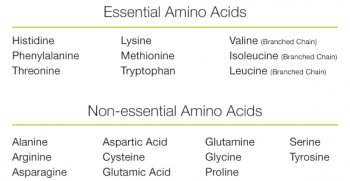
It’s no secret that achieving your optimum level of lean muscle mass can offer you a wide range of health benefits. People who have reached their muscle growth targets have experienced a reduced risk for osteoporosis, and sarcopenia. Others have experienced increases in their metabolism, and increases in strength and stability. Hands down, protein is the foremost macronutrient that is needed to develop the optimum level of muscle mass. Protein is essential for muscle growth and recovery.
Unfortunately, not everyone is able to achieve their muscle building goals. And the most frequently experienced barrier to this, has been not knowing just how much protein one should consume and what type of protein. Coupled with good cardiorespiratory, flexibility and resistance training programs, finding that right level of muscle mass could be right around the corner. Whatever your reason is for reaching your optimum level of muscle mass, here’s how to do it!
So how much protein should I consume?
There is still an ongoing debate on how much protein a person should consume. However, the trend over the last 20 years, for the appropriate amount of protein consumption has been moving upward. How much protein one should consume is based on a person’s gender, age, exercise intensity, exercise duration, energy intake and carbohydrate availability. The current recommended daily allowance (RDA) is .8g*kg-1 body weight. This equates to 72.8 or 73 grams of protein per day for a person who weighs 200 lbs. Unfortunately the RDA for protein intake doesn’t bode well with the American College of Sports Medicine (ACSM). ACSM has determined that those of us who participate in physical activities have different needs because of an increase in protein oxidation and nitrogen balance.
For example, according to ACSM, endurance athletes should consume between 1.2 to 1.4 g*kg-1 per day and strength athletes should consume between 1.2 to 1.7 g*kg-1 per day. Additionally, it is recommended that those who are vegetarians should consume between 1.3-1.8 g*kg-1 per day, because plant proteins are less well digested than animal proteins. (1)
What kind of protein should I consume?
If you eat a balanced diet, you should be able to reach your recommended daily protein intake by eating regular foods. However some opt to add a little extra protein in their diets by consuming protein supplements in the form of powders or shakes. When choosing protein for consumption, it is important to understand that protein quality counts. Protein quality is determined by the presence of essential and non-essential amino acids. Essential amino acids are amino acids that are “essential” however our bodies are unable to produce them. This means that we have to eat these proteins in order to make them present in our bodies. Non-essential amino acids are amino acids that our bodies can make. Foods such as fish, steak, milk or eggs are high in protein and contain all of the essential amino acids. Whey protein is the fastest working protein and casein protein is the slowest absorbing protein. These two proteins can be used to serve different purposes. Plant based foods and products typically do not contain all of the essential amino acids, and soy protein is the only plant protein that contains all of the essential and non-essential amino acids. So those who are vegetarian are at a higher risk of inadequate protein intake.
Amino acids are extremely important to our bodies, as they give cells their structure, and help to repair tissues like muscle, bone, skin and hair. There are 9 essential amino acids and 11 non-essential amino acids. Three of the essential amino acids are branched-chain amino acids. Branched-chain amino acids (BCAAs) have been used to treat diseases such as Lou Gehrig’s disease and McArdle’s disease, and are used by the body differently than other amino acids. BCAAs don’t follow the same digestive route as other amino acids, as they are spared by the liver and go directly to tissues like muscle fibers. Muscle fibers can use them for fuel and muscle repair. BCAAs have also been shown to be important for fat loss.

So the next time you add some protein on your plate or purchase protein supplements, make sure that you consume the right amount and the right type for building lean muscle mass. Protein… it does a body good!
(1) Nutrition And Athletic Performance. (2009). Medicine and Science in Sports and Exercise, 2130-2145.
INTERESTING VIDEO




 Muscle (from Latin musculus, diminutive of mus "mouse") is a contractile tissue of animals and is derived from the mesodermal layer of embryonic germ cells. Muscle cells contain contractile filaments that move past each other and change the size of the cell. They...
Muscle (from Latin musculus, diminutive of mus "mouse") is a contractile tissue of animals and is derived from the mesodermal layer of embryonic germ cells. Muscle cells contain contractile filaments that move past each other and change the size of the cell. They...








